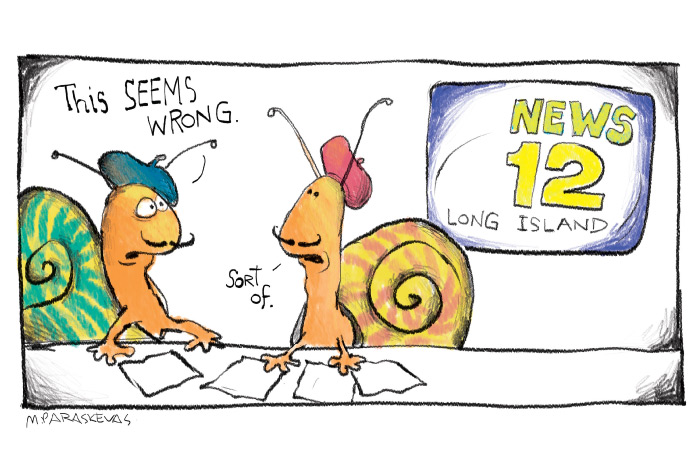Me & Cablevision: Putting to Bed an Old Feud

Nearly half a century ago, I fought a battle and lost. The recent announcement of the sale of Cablevision by the Dolan family means that I can finally put to bed this battle I had with them all those years ago. So now I can reveal it.
At the time it seemed of monumental importance. In retrospect it still seems important, although the fact I’ve held onto this lost battle up until today is ridiculous. Even as I tell this story, I will join you in observing how ridiculous it is today.
When I founded Dan’s Papers in 1960, I originated the concept of the free resort newspaper. I had to persuade people to advertise in it. They said it was not a newspaper, it was a leaflet or brochure. People throw those things away, they only read what they pay for.
I always replied with this answer: We get lots of information from radio and TV. People advertise all over the place on radio and TV. But it’s free to the consumer. Newspapers should be free too. It’s in the Constitution: Freedom of the Press.
In the early 1970s, a few small companies around the nation, including here on Long Island, founded small regional TV cable services. One of them was Sammons Communications. Soon it would be coming to the Hamptons. But then, before it even made a dent out here, it was suddenly gobbled up by a competitor called Cablevision. Soon Cablevision had a stranglehold on cable TV service on Long Island.
I thought to start a cable channel. I thought I could apply to the FCC and get permission to do so, then make a deal with Cablevision to transmit it. I contacted Cablevision. They told me I was a competitor in the media business, and they, the only game in town, would not allow me to broadcast a TV channel on Long Island.
I went ballistic. Cablevision was a PROVIDER. I understood you’d need to pay them to use their cables. But I felt they were way overstepping their bounds in telling me it was they who decided who could put out content over their wires. I contacted our congressman. I contacted the FCC. I wrote about it. Besides the First Amendment rights, they were using the telephone poles. The owner of the telephone company does not interfere with whom you call. Cablevision should not make content decisions either, not for me, not for anybody else.
I fought Cablevision every chance I got. I joined a fight to force Cablevision to set aside a channel for public television stations. They, and the other cable companies around the country, lost that battle. In East Hampton, millionaire Frazer Dougherty was so moved by the situation that he built a studio for public television, still in use today on Industrial Road in Wainscott. It is called LTV, but, although Cablevision was forced to give them this channel and even pay an annual stipend to help fund it, there was something always wrong with this signal. It was blurry. There were lines in it. It had something to do with trying to link things up with Cablevision, Cablevision said. At one point in this war, Cablevision built its own station for the Town of Riverhead on Route 58. They’d control public television. No one could get to be a TV provider on Long Island without permission from Mr. Dolan. All this made me nuts.
I continued to fight Cablevision, at every turn. There was a time, around 1980, when Ron Campsey, the owner of the New Moon Café in East Quogue, tapped into the service he paid for that came into his bar to take a wire out a window and upstairs to the apartment where he and his wife and kids lived. Cablevision had trucks being driven around the area looking for such “stealers of their service.” And here was one, they determined. Ron nearly went to jail fighting this. That he was a Vietnam veteran probably saved him from that.
In stories I’d write about Cablevision, I’d often mention the owner of this company, Charles Dolan, by name. He was a businessman with no public conscience that I could see. Now, as a businessman, he soon made a remarkable business move, almost by accident. He began buying or creating businesses that could provide content for his cable lines.
He created HBO (sold it to Time, Inc. eventually), he created AMC, SciFi, Comedy Central, SportsChannel and News 12. And he purchased Madison Square Garden, Radio City Music Hall, the New York Knicks basketball team, the New York Rangers hockey team and numerous other properties on the cheap. He also started News 12. He owned the wires. He’d own the content.
And I’m still thinking, these properties are going to be worth far more in the long run than Cablevision. He buys them for one thing, but by accident he’ll make money with another.
With these content providers in hand, he continued to refuse to give permission to others to use his lines. He got into battles with rival telecom companies over the airing of the MSG Network, YES, the NFL Network, the Tennis Channel and ESPN3. He also occasionally took off the air Disney, Fox and ABC when they wouldn’t pay him enough. Cablevision felt like essentially, in my mind at least, a monopoly. Nothing we could do.
There came a time, around 1985, when somebody in the marketing division personally called me to ask that I put my differences with Cablevision aside and get on with life. Perhaps they could send me material about their services. Instead, when DIRECTV then became available, I canceled Cablevision. I have DIRECTV today. All I get from Cablevision today is my WiFi service, and that’s because they are the only WiFi service that gets to my house. Give me an option. I’m gone. Verizon, when can I get Fios?
As the years went by, Charles Dolan continued to make his decisions based on maximizing profits for his company. There were reasons to go public. But then, with big profits on the horizon, he tried to take the company private, buying it back cheap. But the shareholders wouldn’t let him. Instead, Cablevision broke in two. There is now a sports and content company (the Madison Square Garden Group, which is not being sold), and there is the cable company (which is).
Charles took in his son James as partner and then got into a fight with him. Charles launched a satellite to provide a non-cable service called Voom. The son had it taken down. Charles retired, that defeat under his belt.
He had other sons. Patrick, who headed up News 12 for a while, cracked down on his TV reporters after 9/11 because they went on the air wearing little American flags in their lapels. The reporters were in trouble. The public was astounded. I don’t know if that son is still there or not.
A New York treasure, the Rockettes, bought by Charles during his content-buying binge, had its wages and perks slashed, making less for the performers and more for the Dolans. The family publicly butted heads with New York City and Mayor Bloomberg, refusing to go along with the Mayor’s plan to create a West Side Stadium for an Olympic bid and where the New York Jets would ultimately play. The Dolans won. James now took a big role with the Knicks. He was the owner. The team ran itself into the ground.
Actually, the only property that the Dolans did a good job with was Newsday, which they purchased from Tribune Co. in 2008. Hats off to them for that.
So now, Cablevision goes to Altice, a French company owned by French-Israeli billionaire Patrick Drahi for $17.7 billion. After paying the stockholders, the Dolans walk away with $2.2 billion.
I wish them well in their future endeavors.



